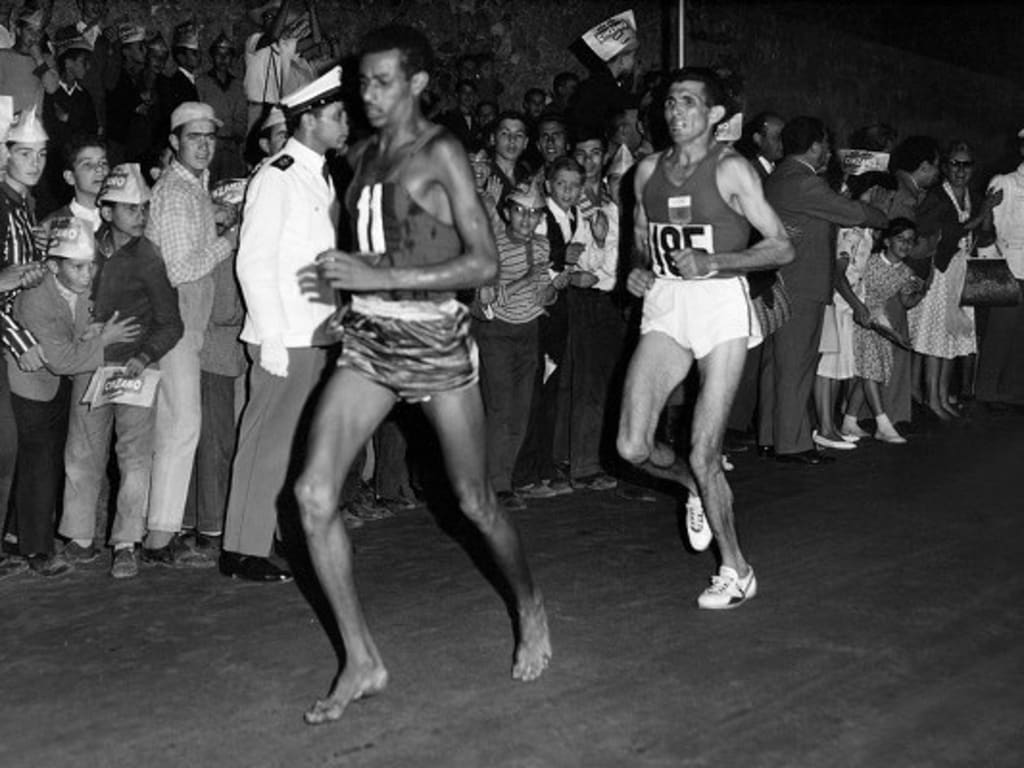
Abebe Bikila was an Ethiopian marathon runner who won two Olympic gold medals, both while running barefoot. He was born in 1932 in a small village near Addis Ababa, Ethiopia. He began running at a young age, and his talent was quickly recognized. In 1956, he was selected to represent Ethiopia at the Olympic Games in Melbourne, Australia. However, he was forced to withdraw from the race due to an injury.
In 1960, Bikila returned to the Olympic Games, which were held in Rome, Italy. He was determined to win the marathon, and he trained tirelessly for the race. On the day of the race, Bikila decided to run barefoot. He had been running barefoot in training, and he felt that it gave him a better grip on the road.
Bikila started the race slowly, but he gradually moved up the pack. By the halfway point, he was in the lead. He continued to extend his lead, and he crossed the finish line first, winning the gold medal. He also set a new Olympic record for the marathon.
Bikila's victory was a major achievement for Ethiopia, and it made him a national hero. He was also a symbol of hope and inspiration for people all over the world. He showed that anything is possible, regardless of your background or circumstances.
Four years later, Bikila returned to the Olympic Games, which were held in Tokyo, Japan. He was once again determined to win the marathon, and he trained even harder than he had for the 1960 Games. On the day of the race, Bikila started slowly, but he gradually moved up the pack. By the halfway point, he was in the lead.
However, Bikila began to experience pain in his legs. He had injured his leg during training, but he had decided to race anyway. The pain worsened as the race went on, but Bikila refused to give up. He continued to run, and he crossed the finish line first, winning the gold medal. He also set a new Olympic record for the marathon.
Bikila's victory in the 1964 Olympics was even more remarkable than his victory in the 1960 Games. He had overcome a serious injury to win the gold medal. He was also the first person to win two Olympic marathons.
Bikila's career came to an end in 1969 when he was involved in a car accident. He was paralyzed from the waist down, but he remained active in sports. He became a coach and a mentor to other athletes. He also founded a foundation to help people with disabilities.
Bikila died in 1973 at the age of 41. He is remembered as one of the greatest marathon runners of all time. He was also a pioneer and an inspiration to people all over the world.
Here is a more detailed story of Bikila's life and career:
Abebe Bikila was born in a small village near Addis Ababa, Ethiopia, in 1932. He was the fifth of eight children. His family was poor, and Bikila had to work hard from a young age. He began running at a young age, and his talent was quickly recognized.
In 1956, Bikila was selected to represent Ethiopia at the Olympic Games in Melbourne, Australia. He was 24 years old and had never been outside of Ethiopia before. He was also relatively inexperienced, having only run a handful of marathons.
However, Bikila was determined to win the Olympic marathon. He trained tirelessly for the race, and he was confident that he could win. On the day of the race, Bikila started slowly, but he gradually moved up the pack. By the halfway point, he was in the lead.
However, Bikila began to experience stomach cramps. He had not been eating properly before the race, and the cramps were severe. He considered dropping out of the race, but he decided to continue running. He eventually finished the race in sixth place.
Despite his disappointing finish, Bikila was not discouraged. He knew that he had the potential to be a great marathon runner. He returned to Ethiopia and continued to train hard.
In 1960, Bikila returned to the Olympic Games, which were held in Rome, Italy. He was now 28 years old and had more experience than he had in 1956. He was also in better physical condition.
On the day of the race, Bikila decided to run barefoot. He had been running barefoot in training, and he felt that it gave him a better grip on the road. He also felt that it was a way to connect with his homeland, Ethiopia.
Bikila started the race slowly, but he gradually moved up the pack. By the halfway point, he was in the lead





Comments
There are no comments for this story
Be the first to respond and start the conversation.